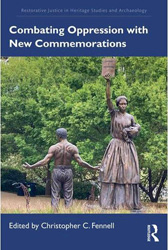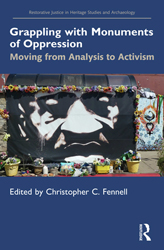|
Restorative Justice in Heritage Studies & Archaeology
Book series Routledge, Taylor & Francis Group, https://www.routledge.com Follow this initiative and series on Facebook.
Series editors Nedra K. Lee, PhD, Department of Anthropology, University of Massachusetts (profile link) Richard Paul Benjamin, PhD, University of Liverpool and International Slavery Museum (profile link) Christopher C. Fennell, PhD, Department of Anthropology, University of Illinois, Urbana-Champaign (profile link)
Overview
Restorative justice in heritage and archaeology embraces initiatives for reconciliation of past societal transgressions using processes that are multivocal, dialogic, historically informed, community based, negotiated, and transformative. This series will present works that promote the active and often unconventional ways that archaeologists, historians, and heritage scholars are contributing to a process of remaking. Our authors work to define and illuminate the best practices for restorative justice in these fields and to identify how practitioners and their collaborators are working to redress, reconcile, and remake contemporary society.
Background
The concept of “restorative justice” has been employed mainly in criminal justice and human rights contexts. For example, restorative justice in the realm of criminal sanctions involves a process of justice other than penalties and imprisonment, and typically entails rehabilitation of offenders through reconciliation with victims and a related, stakeholder community. Such initiatives emerged in the 1970s as ways to address the shortcomings of Western legal systems. New approaches focus on perpetrators of wrongs taking responsibility and acknowledging the harms they created. At the same time, victims of harm have a space to grieve, express their perspectives and stories, seek answers and responses to their needs, and repair relationships.

For example, an archaeological and historical study of past sites of enslavement could provide a focal point for creating new commemorations negotiated among members of local and descendant communities related to those sites. Existing memorials to historical figures who engaged in past oppressive regimes provide similar opportunities for dialog and negotiation to envision new ways to address the context and significance of those figures and the many people who were targets of their oppression.
Such restorative justice efforts typically focus on multiple perspectives and modes of reconciliation, rather than a narrow vision of retribution and punishment. Reparation initiatives are often multivocal, layered, multiplex, and visionary in this way. Restorative justice initiatives often occur through such a collaborative process which entails * relationship building and story-telling, * accountability and truth-telling, and * reparative engagement.

Other examples of such restorative justice projects in archaeology and heritage studies include the current work in Tulsa, Oklahoma to document the 1921 destruction of Black Wall Street and the continuing dynamics of African-American heritage in Tulsa to the present. Elsewhere, archaeologists are collaborating with members of African-American and Indigenous communities to search for missing children. Similar projects search for the remains of the casualties of the Spanish Civil War (1936-1939). Heritage activists also engage with instances of apartheid, cultural destruction through assimilation policies, and genocide in several countries, including work of Truth and Reconciliation Commissions in Canada and South Africa. These examples highlight the bilateral, dialogic, and ongoing process of working towards transformative, meaningful, and enduring justice for aggrieved parties.
We welcome proposals for single-authored, co-authored, and edited volumes. Interested in proposing a book for this series?
Contact one of the series editors: Nedra.Lee@umb.edu, Richard.Benjamin@liverpool.ac.uk, cfennell@illinois.edu.
Guidelines for Routledge (Taylor & Francis) authors (link).
Other useful sources:
American Anthropological Association Resources (link)
American Indian Heritage (link)
Amnesty International Resources (link)
Archaeology Southwest (link)
Association of American Indian Affairs (link)
Association of Critical Heritage Studies (link)
Beniba Centre for Slavery Studies (U. Glasgow) (link)
Center for Heritage and Society (U. Mass.) (link)
Center for Restorative History (Nat' Mus. Am. History) (link)
Centre for the Study of International Slavery (U. of Liverpool) (link)
Conscience Matters Webinar Series (link)
Cultural Heritage Partners (link)
Cultural Survival (link)
Decolonizing Wealth Project (link)
Equal Justice Initiative (link)
Global Initiative for Justice, Truth and Reconciliation (link)
Heritage Voices podcast (link)
Inclusive Historian's Handbook (link)
International Coalition for Sites of Conscience (link)
Learning for Justice (So. Poverty Law Center) (link)
Line in the Sand (Indigenous Peoples’ Rights) (link)
Media Indigena podcast (link)
Monument Lab (link)
Monument Shift (link)
Monuments Toolkit (World Heritage USA) (link)
National NAGPRA Resources (NPS) (link)
Rights Lab (U. Nottingham) (link)
Society for American Archaeology, Repatriation Issues (link)
UNESCO Cultural Heritage & Creativity (link)
UN Fight Racism (link)
US/ICOMOS (link)
Universities Studying Their Links to Slavery (link)
University of Glasgow Reparative Justice Initiative (link)
Wilberforce Institute (U. Hull) (link)
Journals –
Slavery & Abolition (link)
Contemporary Justice Review (link)
Ethnic and Racial Studies Journal (link)
Ethnopolitics Journal (link)
Gender, Place & Culture Journal (link)
Heritage & Society Journal (link)
Identities Journal (link)
Immigrants & Minorities Journal (link)
International Feminist Journal of Politics (link)
J. African Diaspora Archaeology & Heritage (link)
Journal of Community Archaeology & Heritage (link)
Museums & Social Issues Journal (link)
Settler Colonial Studies Journal (link)
Souls Journal (link)
(Last updated: July 6, 2025)
(Photo by Ababu Minda Yimene, from “Transplant and Ampersand Identity: The Siddis of Diu, India,” Journal of African Diaspora Archaeology & Heritage 4(1):19-33).
|
